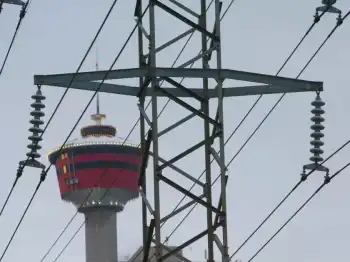Fibrowatt turns chicken waste into power
By Knight Ridder Tribune
Substation Relay Protection Training
Our customized live online or in‑person group training can be delivered to your staff at your location.

- Live Online
- 12 hours Instructor-led
- Group Training Available
At a recent meeting, Fibrowatt officials identified the 125-acre site near Elkin as among the possible locations for one of three future plants. The site is attractive because of its proximity to a Duke Power plant, roads and poultry producers.
"We are negotiating with Duke for a power contract, and that's across the state," said Michael Freeman, a development manager with Fibrowatt. The N.C. General Assembly passed a law this year requiring power companies to begin using renewable energy sources.
In addition to wind and solar power, renewable energy includes energy generated from animal waste. Fibrowatt is moving ahead with each of the three plants in North Carolina simultaneously, officials said. One plant would be in Surry or Wilkes counties. The other two plants would be built in other parts of the state.
Potential sites for those are in Stanly, Montgomery, Moore, Duplin and Sampson counties, company officials said. Fibrowatt officials say they continue to look hard at Surry and Wilkes counties because they are at the center of the region's poultry industry. The new plant would require a half million tons of chicken waste to generate between 40 megawatts and 50 megawatts a year.
Company officials discussed how the plants work with Surry residents and officials at a meeting in the county agriculture building in Dobson. Some residents said they came to the meeting because they were curious.
"I think it looks good," said Keith Mosteller, who lives in Yadkin County and is an air-quality compliance inspector for the state. His family was also in the poultry business for more than 40 years. "I think this is going to help a lot of people. There are a lot of poultry producers who don't have the land to put it (the waste) on. This will be an alternative," he said.
But environmental groups say there are still a lot of questions.
While the Blue Ridge Environmental Defense League supported the provisions in the law that will promote renewable energy, it has concerns about potentially harmful environmental effects from burning animal waste. The group compared an air-quality permit for Fibrowatt's existing plant in Minnesota with a proposed permit for Duke Energy's Cliffside plant, a coal-burning plant still under construction, and found some of Fibrowatt's emissions are higher.
"If it's not improving air quality, then we need to really look hard at what we're getting ready to get into," said David Mickey of the Blue Ridge Environmental Defense League.
But Fibrowatt officials say the comparison is flawed because the coal plant would be one that burns one third of the time. "We are clean," said Rupert Fraser, Fibrowatt's chief executive. "They are trying to scare people."
Fibrowatt opened its first plant in the United States in Minnesota in October. It created about 100 full-time jobs, with 30 employees at the plant. Sixty of the jobs involve litter hauling and 10 more are associated with an ash-fertilizer plant. Fraser said he expects that a new plant in northwest North Carolina would create the same number of jobs.











